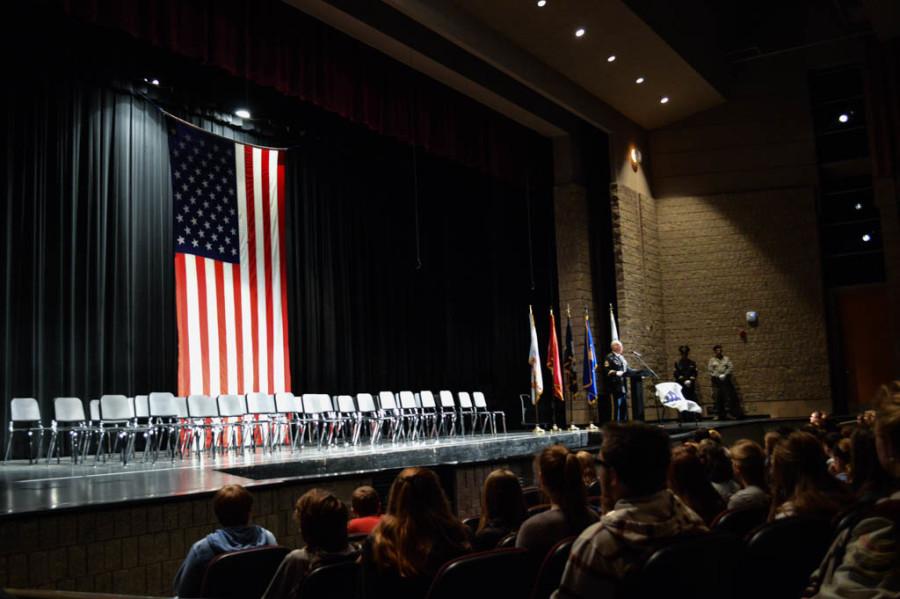The history of Veteran’s Day – How did we end up celebrating in November?
November 19, 2015
In all honesty we, as Americans, don’t give enough thanks to our soldiers; otherwise, we’d celebrate them more than twice a year. Veterans Day gives society the chance to recognize our veterans for their bravery in battle and the sacrifices that they’ve had to make.
Armistice Day, now known as Veterans Day, was originally set as a United States legal holiday to honor and celebrate the end of World War I, officially taking place on Nov. 11, 1918. In 1938, nearly twenty years later, legislation was passed dedicating Nov. 11th “to the cause of world peace and to hereafter celebrated and known as ‘Armistice Day.’” This new holiday honored the veterans who returned from WWI.
In 1954, the Act of 1938 was amended by crossing out ‘Armistice’ and replacing it with ‘Veterans’ after both WWII and the Korean War had ended. It was approved on June 1, 1954 and Nov. 11 became a day that honored all American veterans, no matter which war they fought in.
Fourteen years later in 1968, the Uniforms Holiday Bill was passed, giving federal employees three-day weekends when celebrating four national holidays that landed on Mondays: Washington’s birthday, Memorial Day, Veterans Day, and Columbus Day, along with moving Veterans Day to the fourth Monday in Oct. – was passed. However a good portion of the states did not agree with the bill and continued to celebrate it on its original date. Because of this, the first Veterans Day under the new law, landing on Oct. 25, 1971, was observed with lots of uncertainty.
President Gerald R. Ford finally signed a law that returned Veterans Day to it’s original date of Nov. 11, on Sep. 20, 1975 that would take place in 1978. Since then Veterans Day has remained on Nov. 11.
A Few Things to Know About Celebrating Veterans Day
If the holiday falls on the weekend, the federal government will observe it on Monday (for Sunday) or Friday (for Saturday). The United States Office of Personnel Management establishes what parts of the federal government close, and it is entirely up to each state what will remain open or closed. Non-government businesses are allowed to decide to remain open or closed, as they see fit.
The Difference Between Veterans Day and Memorial Day
The main difference between the two days is that Memorial Day honors the service-members that died in the line of duty or due to injuries that were obtained during battle. Veterans Day also remembers fallen veterans and soldiers, although it was originally set aside to honor and thank the living veterans that served honorably in the military, whether it was during wartime or peacetime.
A Controversial Holiday
Since WWII, there hasn’t been a war that the majority of the American people backed, and there has been backlash within the states. Due to this, some people say that we shouldn’t take care of our veterans because it wasn’t a worthy cause or that the war they fought in wasn’t justified.
“There is a lot of hostility between the government and the American people when it comes to being in a war or fight. But when it comes down to it, people shouldn’t be taking their anger out on the veterans. They don’t start the wars, they just fight them for us,” said Dani Pasco, a former Milford High School student.
It’s clear that everyone has a different stance on the wars that we’ve been in, but people are torn between respecting them for what they did for us and being against them for fighting in said war.
“They fight for themselves, for America, and for their families back home. They lived through it. They deserve our utmost respect and courtesy on Veterans Day. We need to honor and protect them because that’s what they did for us when their own life was on the line,” Pasco stated.
Anna Husic, a senior at Milford, agreed with Pasco.
“It doesn’t matter what someone’s stance on a war is, our vets put their lives on the line for ours. They deserve to be taken care of and honored, every day of the year, but especially on Veterans Day.”
